5 Classic Movies Made By People Who Wanted Them To Bomb
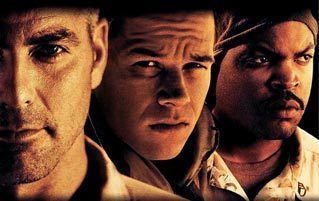
Sometimes things don't work out despite our best efforts. Ed Wood is widely known as the worst director of all time, but the man loved filmmaking -- he always poured his heart and soul into every single failed project. Could the opposite also be true? Can a movie succeed if the very people behind it are doing everything in their power (short of burying the film in the desert or phoning in bomb threats to the theater) to make sure that it fails? Actually, it turns out that even pre-emptive burial and attempted terrorism aren't enough to keep a good flick down. Just take ...
Three Kings

The 1999 comedy-drama Three Kings stars George Clooney, Marky Mark, Ice Cube, and the co-creator of Jackass orchestrating a gold heist during the Iraqi uprising against Saddam Hussein. A contentious setting, to be sure, but the studio had other issues with the movie -- like the budget, the graphic violence, and the strangely light amount of action for an absurdly violent war flick. All the executive input created a very tense atmosphere on set, which of course was being shot by professional egomaniacs in the middle of a real, scorching desert.
One day director David Russell allegedly started assaulting an extra to show the actors how they should bring him down during an action scene. After a substantial directorial mauling, Clooney decided that the director had gone too far and yelled " I'm gonna fuck you up!" at Russell, who then head-butted the actor. Clooney responded by trying to choke Russell with his bare hands, and friggin' nobody standing there holding a camera thought to film what may have been the best fight scene of the movie. It was around that time that the second assistant director, Paul Bernard, quit the production by putting his camera down and walking off the set, presumably to roam the earth like Caine in Kung Fu, assistant-directing for those in need.

Thankfully, everyone knew better than to fuck with '90s-era Ice Cube.
But all the petty squabbling had to take a back seat to some real-life drama when terrorists attacked a Planet Hollywood restaurant in South Africa, claiming that they were protesting U.S. action in Iraq (and wildly overpriced hamburgers). The studio realized that, holy shit, their wacky Iraq War movie might piss off some Iraqis, seeing as it includes a scene where the Americans retrieve a map from an Iraqi's ass (to say nothing of the movie's rampant use of racial epithets like "dune coon," "sand nigger," "towelhead," and "camel jockey"). Sure, it was all satire, but terrorists are generally not "down" with the subtleties of biting social commentary delivered via American comedy.
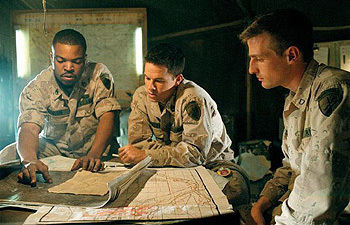
At least they lent the ass-map scene the dramatic gravity it deserved.
But with the film's production already set in stone, they couldn't just shelve it. What they could do, however, was get rid of Clooney, whose personal contract said he could take off and still get paid in full. These fucking Hollywood guys, right? They bail if somebody gets their mocha wrong. So, the studio tried to gently persuade Clooney to pack his bags and leave by implying that if he didn't, angry terrorists would come to his house and murder his balls off. That's a pretty solid argument!
One that didn't convince Clooney in the slightest.

"I survived Batman & Robin. I fear no man. I fear no God."
Clooney shrugged off the terrorist threats, which we remind you were actually delivered by proxy from his own studio, and finished the movie. It went on to make $150 million at the box office (today's money), score a 94 percent on Rotten Tomatoes, get named " some kind of weird masterpiece" by Roger Ebert, and as best we can tell, everybody's balls went perfectly unmurdered.
Psycho

When Psycho came out in 1960, it changed everything. Not only was the movie unusually dark and violent for its time -- it dove right into the disturbed mind of a psychopathic killer living with the ghost of his murdered mother -- it also showed an unmarried couple sharing a bed (hey, that was more shocking than an Eli Roth movie to a 1960s audience). So it's no wonder that when Hitchcock first presented Paramount Pictures with the idea for the movie, they thought he had lost his goddamn mind.

Clearly the man was the very essence of sanity.
Unfortunately for the studio, they were contractually obligated to let Hitchcock make a movie -- ANY movie -- for them (that we didn't get Alfred Hitchcock's Paramount Executives vs. The Rape Spiders is a testament to the man's restraint). But since the contract didn't say anything about studio heads not being unscrubbable ball sacks about it, they went ahead and did just that: They let Hitchcock film Psycho, but took absolutely every opportunity to screw with him while doing it.
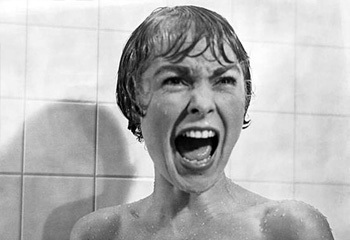
"Instead of a key grip, we decided to hire someone to stand around and scream at you all day. Make it work."
The first step on Paramount's bone list was giving Hitchcock a hilariously small budget, meaning no Technicolor at a time when a director could reasonably expect it and actors whose pay grades would need to triple for them to qualify as slaves. But that didn't stop Hitchcock for even a second: He simply shot the movie in black and white and used the crew from his television show, Alfred Hitchcock Presents. Things still looked grim, though, so Hitchcock ultimately agreed to shoot the movie for free, only taking a cut of the back end if the studio gave him enough cash to finish it, and then distributed it.

We wouldn't be surprised if rough drafts of the script had this scene taking place in the Paramount CEO's office.
Moved by his artistic selflessness, Paramount's heart grew three sizes that day. Unfortunately, that still left it cold and microscopic -- they promptly kicked the director off their lot, telling him to go film his turd over at their rival's place, Universal Studios. They wouldn't even let him use their sets or equipment. Obviously, none of this deterred Hitchcock, who went on to film one of the most profitable films ever, and arguably the most famous suspense horror in history. It may have broken his mind, though, seeing as how he started stapling birds to Tippi Hedren not long after.
The Wicker Man

The Wicker Man (the uh ... the original 1973 version, not the one where Nic Cage wears a bear suit and jump-kicks women in the throat) is generally considered one of the better cult horror films. In a remarkable display of subtlety, The Wicker Man eschews the slicing and dicing of young people in favor of a slowly unfolding mystery about an isolated pagan cult that might be performing human sacrifices. Of course, if you were a 1970s movie exec, that synopsis sounds like box office poison -- especially considering the downer ending where the hero gets burned alive.

This pagan sacrifice is one hit of Ecstasy and some electronic dance music away from Burning Man.
So when EMI acquired the rights to The Wicker Man, they didn't exactly have high hopes for it. Then again, EMI's initial lack of faith quickly turned into a self-fulfilling prophecy once they blocked the movie's director from accessing the final cut of the film and removed 15 minutes of footage from it, including key plot elements. When Christopher Lee saw the final product and demanded to know what in Saruman's glorious beard they did to his movie, the studio head told him that The Wicker Man was " one of the 10 worst films I've ever seen."
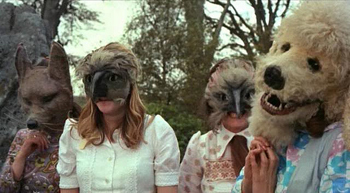
"I thought you said this was scary; I only had terrifying hybrid dog nightmares for five, maybe six nights."
Lee decided to prove him wrong and had his film critic buddies attend a screening of the movie. Even in its mangled form, the critics loved it. Suddenly, the movie that no one wanted was the hottest thing around and the studio was finally convinced to give the unbutchered version a proper release. There was a slight problem with that, though: The original cut of the movie was sent to another studio, where it was literally buried. The consensus says that the film cans with the director's cut were at some point loaded into a garbage truck and buried under the M3 somewhere in the southern U.K. Apparently it was standard practice for British filmmakers to treat potentially poor-quality movies like mummy's curses, lest they return from their entombment to bore the masses for all eternity.

Actually, that curse theory might have some merit.
Luckily, in 1979 an existing copy of the director's cut was discovered and finally saw a wide and hugely successful release, after which The Wicker Man came to be known as "the Citizen Kane of horror movies." And then somebody slapped Nic Cage in the remake, wired him up on gas station counter amphetamines, told him that every single cast member peed in his coffee, and filmed the results. And that's how most people know the movie today. Guard your legacy, kids -- there are villains about.
Marty

Marty is a 1955 drama starring Ernest Borgnine (you probably, tragically, know him best for his work as Mermaid Man from SpongeBob SquarePants) and Betsy Blair as a pair of middle-aged, plain-looking New Yorkers who fall in love despite Borgnine's family and friends being total dicks about their relationship.

Ah, the beautiful people of Hollywood.
It's the sort of slow-moving tale about the human condition that gives film critics week-long erections and ends in a shameful bukkake of self-congratulatory Hollywood awards. In Marty's case, the film won four Academy Awards (including Best Picture) and even became the second American movie to score one of those fancy European Super Oscars, the Palme d'Or, at the Cannes Film Festival. Not too bad for a movie specifically designed by the studio to crash and burn at the box office.

Thirty-six years later, another Ernest would receive the same accolades.
In 1954, actor Burt "I was the old guy from Field of Dreams" Lancaster and producer Harold Hecht faced a "problem" in every sense that the quotation marks imply: Their movies were too successful and made their studio too much money, which would actually end up costing them a bundle after taxes. So the studio came up with the idea to produce a movie so bad that it would become an instant flop and allow the studio to write it off on April 15, earning them a nifty net profit. As you may have guessed, Marty was meant to be that flop.
The studio started by digging up a script from an episode of a third-rate TV show on NBC and had the original writer turn it into a full-length movie on the fly. They followed it by casting, as Lancaster put it, " two ugly people" in the main roles of this romantic dramedy, one of whom was mostly known for playing tough guys. They were so sure it would fail that the studio even had an accountant dutifully add up the costs of the production as they went and actually closed the set once he calculated that they'd lost enough money for the day. However, it turned out that the movie still had to be completed and released for the tax write-off to work, which was when the unthinkable happened: Marty became a hit.

"Mel, Mel, it's Marty! Your cousin, Marty Brooks. You know that new plot you're looking for? Well, listen to this!"
Shockingly, those two "ugly people" that Lancaster was talking about turned out to be more relatable than the beautiful plastic-faced actors that comprise 99 percent of Hollywood. The idea that true love is for everyone, regardless of outer beauty, struck a chord with audiences for some bizarre reason and created a massive pop culture phenomenon. All from a film that literally started out as the plot of The Producers.
Brazil

It's tough to explain the 1985 cult classic Brazil. It's a comedy of sorts (it was written and directed by one of the guys from Monty Python), but at the same time it's also darker than the devil's taint, mostly due to its depressing ending. If there's one thing we've learned, it's that studios don't like it when your film is more than one thing ("Psychological slasher? Dramatic wartime comedy? What are we, computers? Who can keep track of that many words? It's one thing or no-thing, buddy!), so obviously Brazil encountered heavy opposition from the studio before its release.
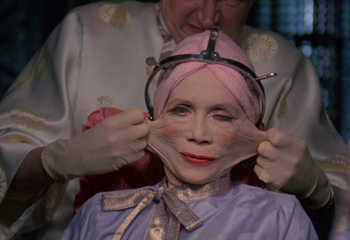
We presume the studio executives made that exact face at the pitch meeting.
Terry Gilliam initially handed over a 142-minute film; the studio insisted that it be 135 minutes, tops, and also have a happy ending where butterflies fly out of a unicorn's mouth and distribute free candy to all the world's children. Then, the studio delayed the movie's premiere so many times that Gilliam paid for the following full-page ad in Variety:
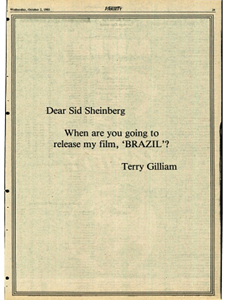
Gilliam made a private disagreement into a public feud, and he did it in a way that made him look like a martyr and the studio guys like typical Hollywood buttholes (which, OK, they were, but that's beside the point!). Luckily, the execs decided to act like adults, by which we mean they threw a fit, basically holding their breath until Gilliam went away: Universal immediately put out an embargo, preventing any theater in the country from showing Brazil, which had already been released abroad. They of course refused to distribute it themselves, and they wouldn't even let any theater show Gilliam's own personal prints. Publicly, studio boss Sid Sheinberg justified this by saying that the film was doing miserably overseas and would probably do as bad here at home, but when the LA Times checked that story, it turned out to be a lie. In the end, fed up with the bullshit, Gilliam started holding private, completely illegal screenings of his film, where it was seen by a few film critics. And so, when Hollywood handed out its Los Angeles Film Critics Association Awards that year, the award for Best Screenplay went to ... Brazil.
Best Picture went to ... Brazil.
Best Director went to ... Terry Gilliam ... for Brazil.

Unfortunately, due to an administrative mix-up, all of Gilliam's awards were mailed to South America.
They say that, to this day, if you look up at the stars above Hollywood, you can still see Gilliam's giant raised middle fingers there, sparkling in the sky for all eternity.
Soon Van writes and builds websites. Evan V. Symon is a moderator in the Cracked Workshop. When he isn't watching movies to see which ones sync up with David Bowie's Ziggy Stardust album, he can be found on Facebook, and be sure to bookshelf and vote for his new book, The End of the Line. Dustin Koski also wrote Six Dances to End the World, which he would oddly prefer to be a successful book. Ryan Menezes is a writer and layout editor here at Cracked. He broke down and made a Twitter page just for his Cracked fans.

Related Reading: For a list of movies that got way more praise than they deserved, click here. Adam Brown will explain why Zero Dark Thirty is way overhyped. For a list of awful movies that had astounding highlights, you'll want to click this link. Ready to learn about movies that kicked off iconic fashion trends? This is the link for you.
The holidays are HERE, which means you're going to need our Cracked app for Android or iPhone to stay sane once the in-laws arrive.